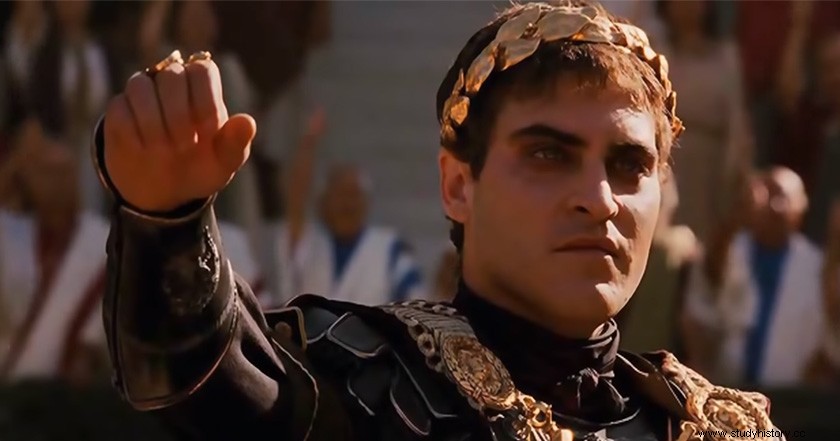
December 31, 192 one of the worst emperors that Rome has given met death. After seeing the famous film by Ridley Scott, Gladiator, we can well think that the "good" Commodus would have liked to meet his death that way, that is, fought in the arena of the Roman Colosseum. But no, the young emperor, only 31 years old, on the day of her death, found her in the big hands of his strangler, while vomiting the poison, which seems to be, his lover had put in his food that day .
Although it is not necessary to remember the great historical errors that the Gladiator movie contains, the end of it is a faithful reflection of reality; a Rome without direction, headless and submerged in disputes between the Senate and the army. Allow me to remind you of a scene from the film in which the mythical Maximus Tenth Meridio appears in the corridors of the Roman Colosseum, saying to the conspirators of Commodus:“help me escape from the Praetorians to the city walls, I will go there with a horse. to Ostia, to return as quickly as possible with my 5,000 faithful legionnaires; It will be the end of Commodus.” Undoubtedly a clue for the next events, now yes, we can ask ourselves the question:And after Commodus, what?
The year of the five emperors.
Commodus left an empire at the gates of the harshest economic, social and political crisis that Rome had to experience. Which will produce a new scenario among the bearers of purple. Doing accounts there were three great powers at that time. The senators of Rome, with an increasingly secondary role, but enriched and fattened occupying positions of privilege. Secondly, the Praetorian Guard, the most faithful companion of Commodus, and the best paid legionnaires who are in charge of defending the emperor at all times. Finally, the armies stationed in the limes of the Empire, well away from power, and providing the bread necessary for the great Rome to continue to increase its excessive ego. Clearly this was a good time to change things.
Plubius Helvius Pertinax.
A few hours after the assassination of Commodus, his conspirators showed up at the house of the second in command in the Empire, the prefect of Rome Pertinax. He had it quite clear, with 66 years behind him, he did not need to go through the bad experience of having to win over the people of Rome, wounded in his pride after the death of his favorite emperor. But the Senate did not give him a choice, he needed to legitimize power as soon as possible, and the chosen one seemed easy to handle. That same day, January 1, the Senate is convened and Pertinax elected as the new emperor. The senators soon make it clear what they thought of his predecessor, a few days later they proclaim the Damnatio memoriae , that is, to ban images of Commodus, statues, inscriptions, or anything that recalls Rome's dark past throughout the Empire.
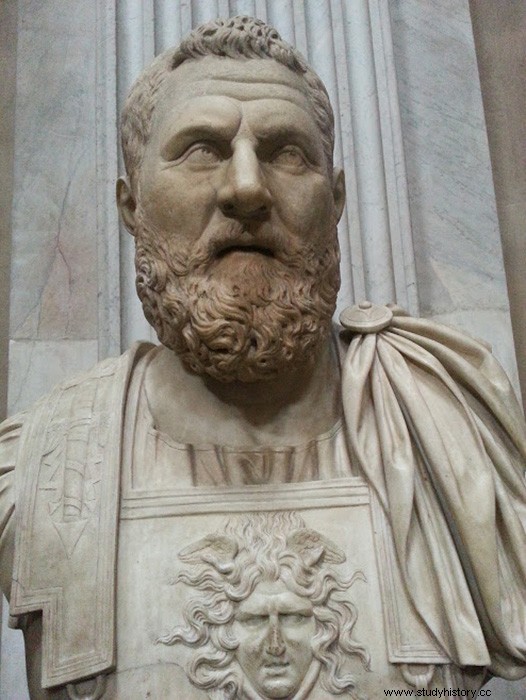
But Pertinax had every reason to be worried; the Praetorian Guard did not forgive and despite the fact that the first decision of the new emperor was to pay 12,000 sesterces to each Praetorian, this did not seem to please them. In this way, Pertinax found himself between two fronts; since in addition to the praetorian pressure, the Senate also urged him, in this case to undertake the necessary economic reforms, to compensate for the crisis that Commodus had left behind. He could not take a false step, but that is what he did, after paying a part of what was promised to the Praetorians, he began with the savings policies. Although he had no other choice, the Praetorian Guard did not understand this and demanded the rest of the payment. At the beginning of March, the first plot against Pertinax arrived, resolved with the execution of several Praetorian leaders, but the second time was the charm, on March 28, on the way to the Palatine, he was surrounded by 300 Praetorians who killed him.
Didius Julianus.
On the very day of Pertinax's death, the Empire and the city of Rome became the subject of public auction. Senators and wealthy patricians went to the Praetorian camp, located on the outskirts of the city. Of all of them, the highest bidder and therefore the chosen one was a renowned senator, a personal friend of Pertinax, Didius Julian, who offered each Praetorian Guard 25,000 sesterces, it is difficult to imagine what he offered to higher-ranking officials.
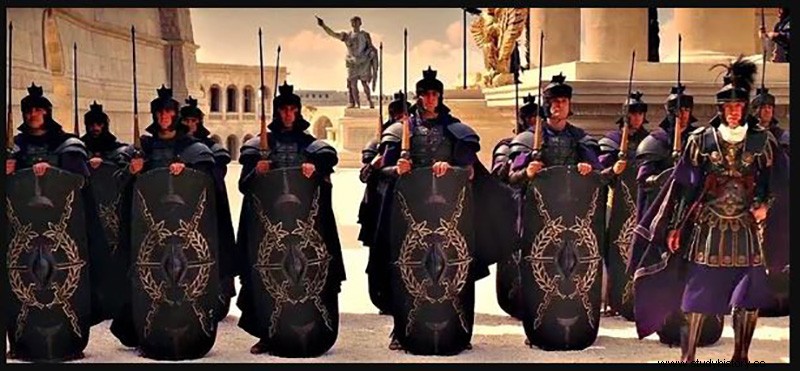
The Praetorian Guard
But the people of Rome were not so easily fooled, the new emperor's first public appearance in the Circus Maximus ended in tumult, with Didius Julian being attacked by the mob. Only the Praetorian Guard could save his life. But the Empire at the end of the 2nd century was very large, the news flew down the Roman roads and soon reached its limes. If in Rome the Praetorian Guard exercised control, let's see who could stop the Roman legions. In such a way that three of the provincial governors, who precisely ruled over the three provinces with the largest number of legions, set off for Rome in search of their legitimacy as emperor. That is, in the spring of the year 193 d. C. three emperors were born at the same time, now it was just a matter of speed, the one who arrived first in Rome would become the new emperor.
Lucius Septimius Severus.
Born in the Roman province of Africa, specifically in Leptis Magna. Septimius Severus, was in said spring at Carnuntum , in the Roman province of Superior Pannonia in command of three legions, in what we can now call Austria. It is evident that he started with a certain advantage by being closer to Rome. At the command of his three legions, he advanced with enormous speed, according to some sources the legionnaires slept with their own armor, so as not to lose time. Only the prefect of the Praetorium, I try to stop him without success.
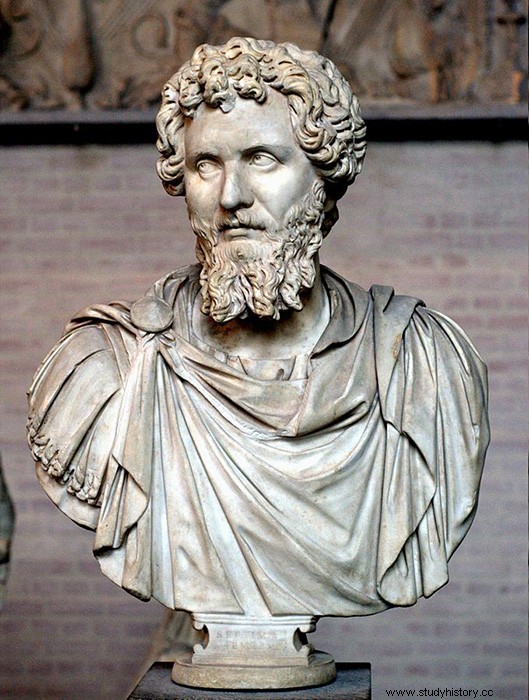
Septimius Severus
The news in Rome shattered the pacts between the different actors in the sale of the Empire. Praetorians and senators soon withdrew support from Didius Julianus, who was found assassinated on the first day of June, even before the arrival of Septimius Severus' mighty army in Rome. Therefore, nine days after the death of Didius, the entry into Rome of the legions of the African emperor became a walk through the streets of the Imperial capital, effectively the Senate had already proclaimed him emperor.
His first decision from him as soon as he arrived, was that the Praetorian Guard would form in front of the new emperor unarmed, the Praetorians were dismissed and expelled from Rome. Septimius Severus' best men became Rome's new Praetorian Guard. The next step was to control the Roman Senate as much as possible, ordered the execution of several men close to the old emperor and replaced some senators by imposing men he trusted. Now it only remained to contain the other two rivals, although the first of them was not a problem at the moment, Clodio Albino had accepted a few days before the strange pact of becoming Caesar, and therefore, successor of the new emperor after the death of this .
Pescinio Niger.
The next candidate for the purple of Rome, started from a clear disadvantaged position, mainly due to its distance from the capital, but with very broad support from the eastern armies of the Empire, who apparently felt great admiration for Pescinio Niger. After news from Rome reached him, he assembled the bulk of the eastern legions in the city of Antioch, where he was proclaimed by them emperor of Rome. The next step was to head towards the Imperial city, but not before controlling Byzantium, the Dardanelles Strait was key to the control of the eastern provinces.

Pescinio Niger Denarii
Meanwhile, Septimius Severus had done the same, after making things clear in Rome, and dividing his army in two. A part went by sea to North Africa, knowing the possibility that the African troops supported Niger, it had to control the supply of wheat, which mainly came to Rome from the African provinces. The rest, with him in the lead, headed east, to meet the Nigerien troops. The battle between Romans always favored the side of Septimius Severus, in April of the following year 194, near Issos, the African emperor was victorious. Pescinio Niger with the help of his trusted men managed to escape, but was caught very close to entering the territory of the Parthians, and then executed. Not content with this fact, the emperor in an act of great cruelty ordered the execution of the family and trusted men of Niger, in order to obtain total control of the eastern part of the Empire, this work led him to lose another year. in the East.
Tenth Clodius Albino.
The fifth and last Roman emperor in the year 194, was also born in Africa, and when Didius Julian was proclaimed emperor in Rome, he was in Britannia commanding the legions stationed there They proclaimed him emperor. But as we have pointed out before, he accepted the pact offered by Emperor Severus, to become his successor, after said pact he kept waiting for subsequent events.
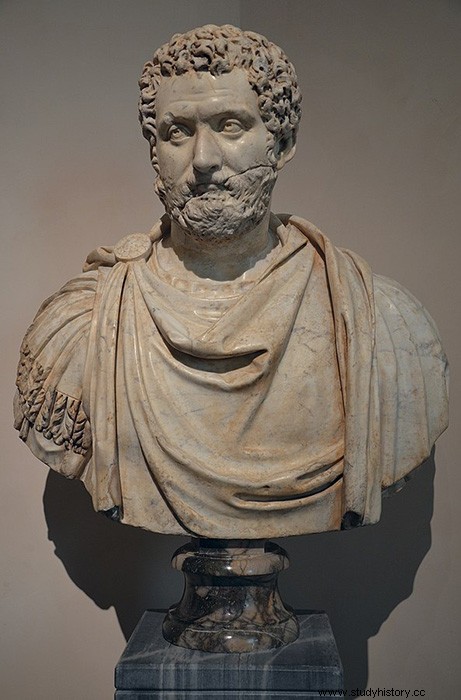
Clodius Albino
On the other side of the Empire, after wiping out all Niger-like enemies in the city of Byzantium, Septimius Severus made a strange change in the line of succession. It is not clear if this was motivated by a personal decision, or if it was a reflex action, in the face of Albino's movements to quarter legions in Gaul. The truth is that the young Basiano, who years later we will know as Caracalla, was proclaimed successor by his father at the age of 10.
While Albino's troops settled in the city of Lugdunum , present-day Lyon in France. The confrontation at the beginning of the year 197, is cataloged as the cruelest among the Roman legions themselves. Albino had the help of detachments from the western provinces, although the participation is not clear, it is deduced that the Hispanic troops could have been on his side, due to the subsequent reprisals against Hispanic politicians. The hard confrontation also fell on the side of Septimius Severus, Albino according to some sources committed suicide with his own sword, and his body dragged by Septimius Severus' own horse. These aspects reported by Dio Cassius are continually questioned by current historiography, due to the proven enmity of the Roman senator with respect to the army. The subsequent purges carried out by Septimius do not offer the same doubts, repeating the procedure with the previous rival Niger, in this case with the cruelty of ending the life of Albino's wife and young children.
Since that year 197, Septimius Severus took control of the Empire, an Empire that would never be the same again, the armies had definitively taken control of Rome.
One of the phrases that the African emperor left us for later sums up the future of the Empire perfectly, on his deathbed and addressing his children he said:“Stay united, enrich the soldiers and don't worry about everything else ”. False or not, since Dio Cassius transcribed it again, it became a reality.
To conclude, I invite you to learn a little more about the history of the Emperor Septimius Severus, in this great article by Sergio Alejo:sergioalejogomez.com/septimio-severo
More info:
The Fall of the Roman Empire, Adrian Wolsdworthy, Ed. The sphere of books, 2009.
More info:Historia de Roma, J. Cabrero and P. Fernández Uriel, Ed. Uued, 2008.
Images:
commons.wikimedia
